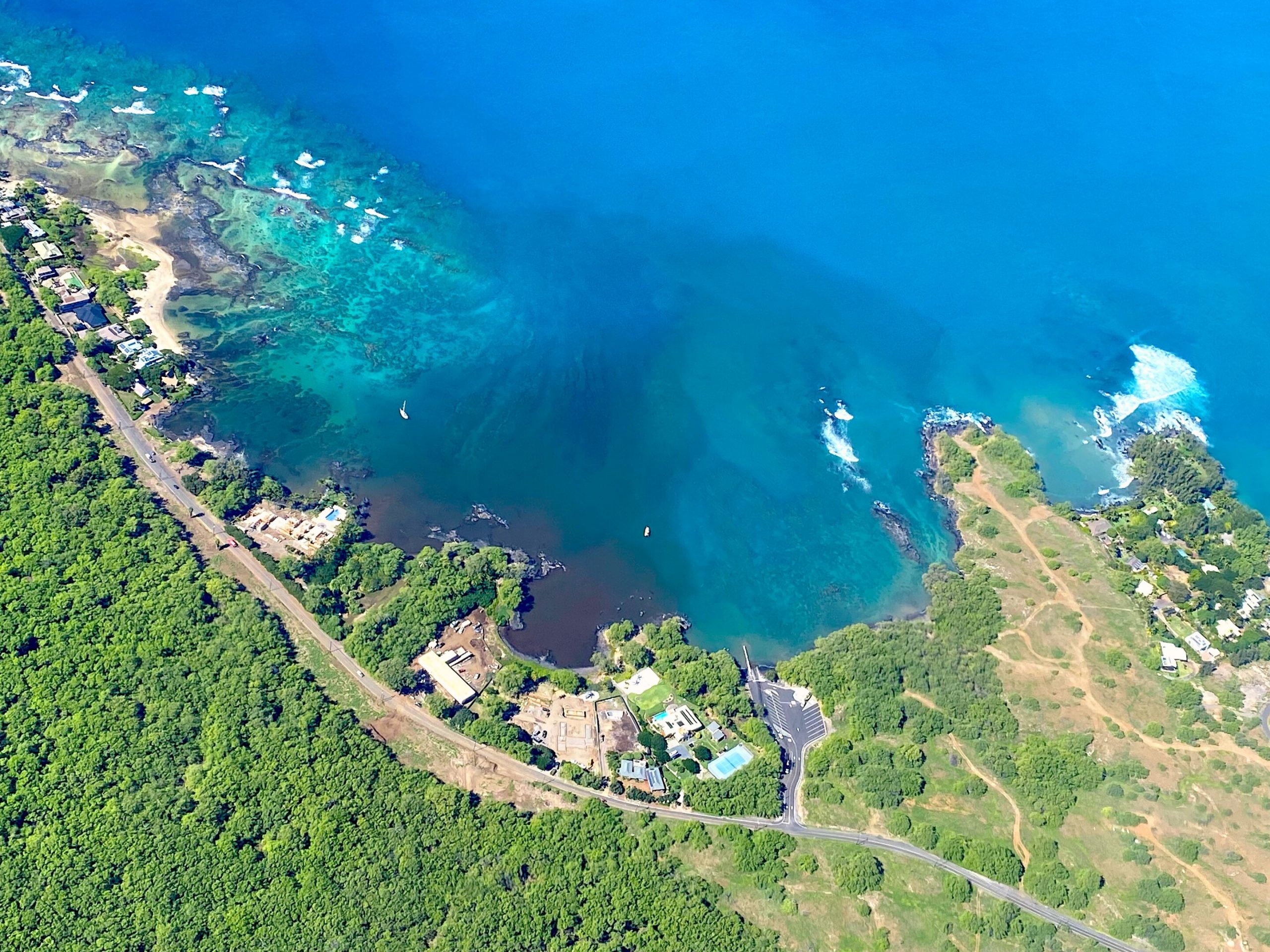Hawaii Still Has A Serious Cesspool Problem
The state needs to speed up upgrade conversion rates and help homeowners with the costs.
March 29, 2024 · 6 min read

About the Authors
Ted Bohlen is a retired deputy attorney seneral for the state’s Department of Health and the founder of the Hawaii Reef and Ocean Coalition. He served on the state’s Cesspool Conversion Working Group from 2018-2022.
Stuart Coleman is the co-founder and executive director of WAI: Wastewater Alternatives and Innovations. He served on the state’s Cesspool Conversion Working Group from 2018-2022.
The state needs to speed up upgrade conversion rates and help homeowners with the costs.
Ola i ka wai. If water is life, as the Hawaiian proverb goes, we should protect it with our lives. Though buried underground and hidden out of sight, cesspools are the greatest threat to water quality and the largest source of pollution in the state.
Hawaii has 83,000 cesspools that inject 52 million gallons of untreated sewage into the ground and our groundwater each day. That’s like a daily massive sewage spill, polluting our waters and threatening human health and our environment.
A cesspool is just a hole in the ground, discharging all the raw sewage from a home into the groundwater without any treatment. Hawaii has the most cesspools per capita in the country and was the last state to ban them.
After kicking the can down the road for decades, it is time for the state to pass legislation to help homeowners convert their cesspools. Legislators are currently considering five bills that focus on cesspools and wastewater pollution.
As substandard treatment systems, cesspools threaten public health and can contaminate drinking water sources. South of Hilo, Hawaiian Paradise Park has over 1000 of the cesspools in the state, and a DOH study of private drinking water wells in the area showed that 50% of those tested contained fecal indicator bacteria — signs of poop in their water. Another study of Upcountry Maui, where there are over 7,400 cesspools, revealed elevated rates of nitrogen in the groundwater, which can lead to increased rates of cancer and “blue baby syndrome.”
People who spend time at the beach or in coastal waters often experience skin infections or gastro-intestinal problems. As paddlers, surfers and beach goers know all too well, Hawaii has the highest rates of staph and methicillin-resistant Staphylococcus aureus (MRSA) in the country.
Many people have had to receive medical treatment for these infections, and extreme cases required surgery and amputations. The ocean used to be a source of healing, but now it is polluted and can cause serious infections.
Killing Reefs
Cesspools are also killing coral reefs. A recent publication in the journal Nature showed that nitrogen in human waste fertilizes algal overgrowth that smothers and kills coral reefs. Coral reefs are already under intense stress from ocean warming, bleaching events and decreasing populations of reef fish. They will not survive if we don’t radically reduce pollution from cesspools and other land-based sources.
Cesspool pollution can also hurt tourism. When visitors learn how cesspools are polluting our waters, they may not come back to Hawaii.

Worsening water quality, dying reefs and declining fish populations will likely lead to reduced tourist numbers. That poses a serious economic liability to the state and would damage Hawaii’s economy and reputation as a world-class destination.
Cesspools can also decrease the value of home prices in Hawaii. A recent study in the journal Climatic Change found that the “presence of OSDS (Onsite Sewage Disposal Systems), including cesspools, lowers property transaction prices.” That hits home for new buyers who have to spend even more money to convert existing cesspools.
By law (Act 125 of 2017), all cesspools must be upgraded by 2050. We are currently converting less than 300 cesspools each year, but that rate will have to go up ten times to over 3,000 per year to meet the mandate of converting all cesspools by 2050.

To reduce cesspool pollution and meet this legal mandate, Hawaii needs to speed up the conversion rates and help homeowners with the costs. The good news is that these efforts will lead to the creation of hundreds of new jobs, while also stimulating the economy and protecting water quality.
Fortunately, there are five bills still moving forward at the legislature this session, but they need to be scheduled for final hearings by April 2. These bills contain some of the top recommendations of the Cesspool Conversion Working Group, which met from 2018-2022. They represent practical, common-sense ways to move forward and reduce cesspool pollution across the state.
House Bill 2743 creates a pathway for the state to work with the counties to figure out where sewer lines can be extended in limited areas and where individual upgrades will be needed. The bill also gives authority to the counties to charge a small fee for cesspool owners and create a fund to help low-income homeowners with the cost of conversion.
For decades, cesspool owners have paid nothing to treat their own waste. It is not fair that those who are polluting our resources don’t pay anything for waste treatment. Meanwhile, the majority of people have already paid to upgrade their cesspools or are paying monthly sewer fees.
House Bill 1892 would create earlier deadlines for converting cesspools in Priority 1 and 2 Areas, where pollution problems are the worst. This means upgrading to a DOH-approved on-site wastewater system or connecting to county sewer or a decentralized package system.
Hawaii has the most cesspools per capita in the country and was the last state to ban them.
HB 1892 would also continue the successful grant program created under Act 153 to help homeowners with the cost of conversion. Federal, state and county revenue should be used as much as feasible to ease the burden on cesspool owners.
Currently, five other bills have not been scheduled for final hearings before the Senate and House budget committees, even though they do not involve substantial appropriations: House Bill 2743 (Relating to Wastewater), Senate Bill 2513 (Relating to Wastewater Systems), House Bill 1892 (Relating to Cesspools), House HB 1759 (Relating to Cesspools) and House Bill 1691 (Relating to the Environment).
We ask the Senate Ways and Means and House Finance Committees to address cesspool pollution by scheduling hearings on these bills by the April 2 deadline.
The process of upgrading the 83,000 cesspools across the state will be expensive, but the cost of not doing so will be even higher and more devastating in the future. In order to protect public health, water quality and our natural resources, we all need to work together to solve this problem.
That means talking and working with our federal and state legislators, county officials, community leaders and individual homeowners to convert cesspools and find the best and most affordable sanitation solutions.
It’s time to take action and protect the water that gives us life.
 Sign up for our FREE morning newsletter and face each day more informed.
Sign up for our FREE morning newsletter and face each day more informed.
Community Voices aims to encourage broad discussion on many topics of community interest. It’s kind of a cross between Letters to the Editor and op-eds. This is your space to talk about important issues or interesting people who are making a difference in our world. Column lengths should be no more than 800 words and we need a photo of the author and a bio. We welcome video commentary and other multimedia formats. Send to news@civilbeat.org. The opinions and information expressed in Community Voices are solely those of the authors and not Civil Beat.
Read this next:
Jonathan Okamura: UH Needs To Provide More Support For Samoan Students Who Don't Play Football
By Jonathan Y. Okamura · March 31, 2024 · 6 min read
Local reporting when you need it most
Support timely, accurate, independent journalism.
Honolulu Civil Beat is a nonprofit organization, and your donation helps us produce local reporting that serves all of Hawaii.
ContributeAbout the Authors
Ted Bohlen is a retired deputy attorney seneral for the state’s Department of Health and the founder of the Hawaii Reef and Ocean Coalition. He served on the state’s Cesspool Conversion Working Group from 2018-2022.
Stuart Coleman is the co-founder and executive director of WAI: Wastewater Alternatives and Innovations. He served on the state’s Cesspool Conversion Working Group from 2018-2022.
Latest Comments (0)
It's a problem. And there are more solutions than just septic systems. But they need to be rationalized to local sites.The Hawaii County Department of Environmental Management has been reaching out with explanations of a range of Department of Health solutions. Many, such as composting toilets and gray water systems don't get much attention because they may not apply in the most important problem areas such as coastal developments. And yes, many of our lands are porous like Swiss cheese and even septic systems will not do the job adequately. And legacy subdivisions on Hawaii Island (abetted by a laissez-faire politics) neglected the most basic infrastructural needs for complete build out scenarios.What's happening right now at Milolii ('the last Hawaiian fishing village') is just the most current egregious example!As the saying goes, "the best time to plant a tree" (or to have planned for growth) "was twenty years ago". We all share the blame and the burden to now get right with our neighbors and Mother Nature. It's really a function of unquestionable perpetual growth expectations...and its tag-along pains! Is anyone checking in on the County's 2045 General Plan update?
MarkT · 1 week ago
Midwestern Mainlander here, who cherishes the aina, whether in Missouri or Kauai. Been to Hawaii over the years. Most of my 63 years has been spent with septic systems.One house per 3 acres, with percolation tests before building. And the county's onsite approval. If buying a home with septic, permits, onsite checks, and a couple conversations about how many folks are living there. It's not perfect, but it's a plan. Can the state of Hawaii implement something similar? I know Hawaii is utterly different, and homes are grandfathered. But our land and water are precious, no matter where they are. Being aware of the issue, we have an obligation to fix it. Yeah, I am a dreamer.
Kasia · 1 week ago
The Red Hill news has masked the problem with cesspools. While living in Hilo in the 1980s, we experienced two 100 year rains in a row; concrete cesspool covers were blown off by water pressure from volcanic tubes intersecting with cesspools, and homeowners were pouring gallons of Chlorox in their yards because: "A gram of feces can contain 10 million viruses, 1 million bacteria, 1,000 parasite cysts, and 100 worm eggs." The Big Necessity: the world of human waste by Rose Goerge. When we bought our house in Honolulu, it had a cesspool and as a condition of closing, we required the seller to connect to the city sewer line, which he did at his cost. Honolulu is under an EPA consent decree for large cesspools. My UIPA requests to BWS for their knowledge about the course of water flows in the Oahu aquifers were responded to: we don't know, and we are drilling monitoring wells to find out. Good luck with waiting for data. But the effect of cryptosporidium is well documented in the US: in Milwaukee, Wisconsin, 400,000 people were sickened and 100 died in a water contamination disease outbreak (The Big Necessity). Get rid of the cesspools.
KKF · 1 week ago
About IDEAS
IDEAS is the place you'll find essays, analysis and opinion on every aspect of life and public affairs in Hawaii. We want to showcase smart ideas about the future of Hawaii, from the state's sharpest thinkers, to stretch our collective thinking about a problem or an issue. Email news@civilbeat.org to submit an idea.


